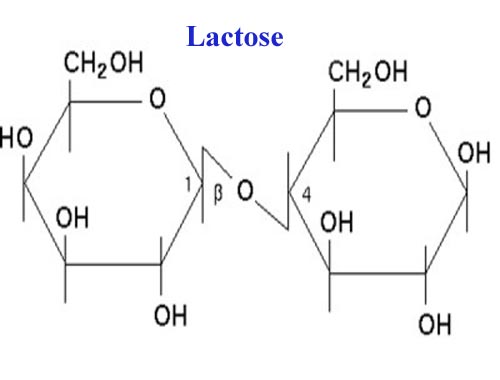Lactose Intolerance, Lactase deficiency (hypolactasia)

Published: 18 Jun 2025
ICD9: 271.3 ICD10: E74.39 ICD11: 5C61.6
Lactose intolerance, also known as lactase deficiency or hypolactasia, is a common digestive problem where the body can't easily digest lactose, a type of sugar mainly found in milk and dairy products.
This happens because the body doesn't produce enough of an enzyme called lactase.
Here's a breakdown:
![]() Lactose: Lactose is a disaccharide (a sugar made of two smaller sugars: glucose and galactose) found in milk and dairy products.
Lactose: Lactose is a disaccharide (a sugar made of two smaller sugars: glucose and galactose) found in milk and dairy products.
![]() Lactase: Lactase is an enzyme produced by cells in the small intestine. Its job is to break down lactose into glucose and galactose, which can then be absorbed into the bloodstream and used for energy.
Lactase: Lactase is an enzyme produced by cells in the small intestine. Its job is to break down lactose into glucose and galactose, which can then be absorbed into the bloodstream and used for energy.
![]() Lactase Deficiency (Hypolactasia): When the small intestine doesn't produce enough lactase, the lactose in milk and dairy products isn't properly digested. This undigested lactose then moves into the colon (large intestine).
Lactase Deficiency (Hypolactasia): When the small intestine doesn't produce enough lactase, the lactose in milk and dairy products isn't properly digested. This undigested lactose then moves into the colon (large intestine).
![]() Lactose Intolerance: In the colon, the undigested lactose is fermented by bacteria. This fermentation process produces gases and acids, which can lead to the symptoms of lactose intolerance, such as:
Lactose Intolerance: In the colon, the undigested lactose is fermented by bacteria. This fermentation process produces gases and acids, which can lead to the symptoms of lactose intolerance, such as:![]()

![]() Bloating
Bloating![]()

![]() Gas
Gas![]()

![]() Diarrhea
Diarrhea![]()

![]() Abdominal cramps
Abdominal cramps![]()

![]() Nausea
Nausea![]()

![]() Sometimes vomiting
Sometimes vomiting
Key Points:
![]() Not an Allergy: Lactose intolerance is a digestive issue, *not* a milk allergy. A milk allergy involves the immune system and can cause more severe reactions.
Not an Allergy: Lactose intolerance is a digestive issue, *not* a milk allergy. A milk allergy involves the immune system and can cause more severe reactions.
![]() Severity Varies: The severity of lactose intolerance varies widely from person to person. Some people can tolerate small amounts of lactose, while others experience symptoms even with minimal dairy intake.
Severity Varies: The severity of lactose intolerance varies widely from person to person. Some people can tolerate small amounts of lactose, while others experience symptoms even with minimal dairy intake.
![]() Types of Lactase Deficiency:
Types of Lactase Deficiency:![]()

![]() Primary Lactase Deficiency: This is the most common type and is often genetically determined. Lactase production naturally declines after childhood in many people.
Primary Lactase Deficiency: This is the most common type and is often genetically determined. Lactase production naturally declines after childhood in many people.![]()

![]() Secondary Lactase Deficiency: This is caused by damage to the small intestine due to illness, surgery, or other conditions like celiac disease, Crohn's disease, or gastroenteritis. Lactase production may return to normal after the underlying condition is treated.
Secondary Lactase Deficiency: This is caused by damage to the small intestine due to illness, surgery, or other conditions like celiac disease, Crohn's disease, or gastroenteritis. Lactase production may return to normal after the underlying condition is treated.![]()

![]() Congenital Lactase Deficiency: This is a rare genetic disorder where infants are born with very little or no lactase.
Congenital Lactase Deficiency: This is a rare genetic disorder where infants are born with very little or no lactase.![]()

![]() Developmental Lactase Deficiency: This can occur in premature infants whose small intestines haven't fully developed.
Developmental Lactase Deficiency: This can occur in premature infants whose small intestines haven't fully developed.
![]() Diagnosis: Lactose intolerance can be diagnosed with a lactose tolerance test, hydrogen breath test, or stool acidity test.
Diagnosis: Lactose intolerance can be diagnosed with a lactose tolerance test, hydrogen breath test, or stool acidity test.
![]() Management: Lactose intolerance is managed by reducing lactose intake. This can be achieved by:
Management: Lactose intolerance is managed by reducing lactose intake. This can be achieved by:![]()

![]() Avoiding or limiting dairy products.
Avoiding or limiting dairy products.![]()

![]() Choosing lactose-free dairy alternatives (e.g., lactose-free milk, yogurt, cheese).
Choosing lactose-free dairy alternatives (e.g., lactose-free milk, yogurt, cheese).![]()

![]() Using lactase enzyme supplements (e.g., Lactaid) to help digest lactose.
Using lactase enzyme supplements (e.g., Lactaid) to help digest lactose.![]()

![]() Reading food labels carefully to identify hidden sources of lactose.
Reading food labels carefully to identify hidden sources of lactose.
In summary, lactose intolerance is a common condition caused by a deficiency of the lactase enzyme, leading to digestive discomfort after consuming lactose-containing foods. It's generally manageable through dietary modifications and, if needed, lactase enzyme supplements. It's important to consult a doctor or registered dietitian for personalized advice and management strategies.